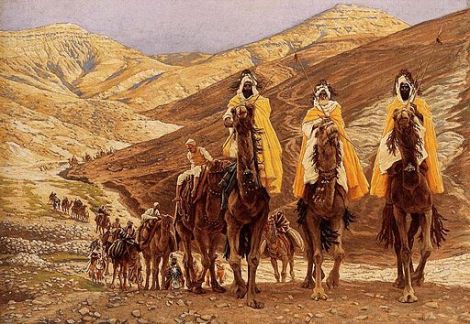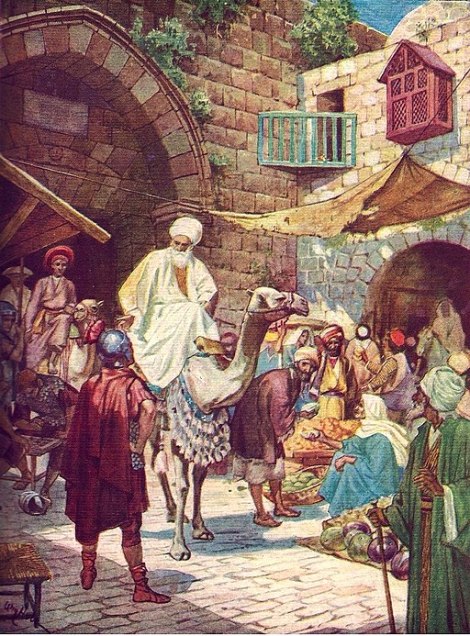
Isaiah 7:14
“Therefore the Lord Himself will give you a sign: Behold, a virgin will be with child and bear a son, and she will call His name Immanuel.”
Isaiah 9:6
“For a child will be born to us, a son will be given to us;
And the government will rest on His shoulders;
And His name will be called Wonderful Counselor, Mighty God, Eternal Father, Prince of Peace.”
A child born, not a son born. The Son is preexistent, the I AM, and did not come into being that day when Mary gave birth. God gave us His Son. He left heaven, emptied Himself, took the form of a bondservant, and was found in the likeness of Man.
He who fashioned Man in His image, took the likeness of the one He had fashioned. And as a child, He was born—the humble relinquishing of His place at the right hand of the Father in order to secure for us a place at His heavenly banquet table.
I can’t conceive of a greater example of love. The Father giving His beloved Son. The Son obeying the Father and leaving His heavenly home to come to earth. The Triune God expressed His love for us in giving Jesus and in His coming in the form of Man.
In that one act God showed His generosity, His self-sacrifice. But He also showed what His love means: it’s not sentimentality or warm, fuzzy feelings. It’s not tit for tat or “I’ll scratch your back if you scratch mine.” It has no limits and is freely given. Further, God’s love “has legs”—it’s not just an emotional expression but it has action to back it up.
God’s love is not about God spoiling us. He doesn’t treat us like a sugar daddy. His love has our best in mind—a spiritual and eternal best. Consequently, God doesn’t hesitate to correct us as part of His love for us. He will not withhold discipline for fear that we might not like Him as well any more. He’s also not concerned about people concluding that they might be nicer than He is. He knows the truth and His love doesn’t compromise the truth.
In fact, God’s love is an extension of His character. He can no more stop loving than He can stop being God.
What did it mean for Immanuel, God with us, to take up residence outside of glory? He was subject to all the stuff of Mankind—the passions and joys and hopes and successes, but also the dreams cut short, the sadnesses, the temptations.
Indeed, the temptations. Scripture says He was tempted in every way we are, yet without sin:
For we do not have a high priest who cannot sympathize with our weaknesses, but One who has been tempted in all things as we are, yet without sin. (Heb. 4:15)
Impossible, some may think. How could He be tempted to OD on computer games or look at dirty pictures?
We know He lived life among us for over thirty years. At different junctures during His public ministry, the religious leaders laid traps for Him, trying to trip Him up so they could catch Him in an offense they could prosecute by law.
But what about those years before He began preaching and healing? Isn’t it likely that the strains of His blended family created temptations? Perhaps He also faced noisy neighbors during those years or the abuse of a bully. Because of the wedding in Cana, we know He had to deal with the expectations of His mother. Perhaps He also dealt with jealous brothers.
Later He may have had to deal with the temptation to abandon His life work to fit in with the role His family likely expected Him to fill—that of elder brother, settling down, marrying, and caring for their widowed mother.
Unfortunately we too often reduce Jesus’s temptations to three—the notorious ones recorded in the gospels for us where Satan entices Him to made bread from stones, to swap worship for power, and to test God’s promise. Lots of people have lots to say about these temptations—the kinds, the depth, the significance. Meanwhile, we’re overlooking a little clause in Mark 1:13.
And He was in the wilderness forty days being tempted by Satan; and He was with the wild beasts, and the angels were ministering to Him. (Emphasis mine)
So on top of the thirty years of temptations Jesus encountered by living life among us, he also had an intense forty days of Satan throwing whatever he could at Jesus. Whatever we face today, Jesus faced a comparable temptation.
But His coming among us served two greater purposes than offering us an understanding heart to turn to when temptations crowd in upon us.
First, He showed us God. If you’ve seen me, you’ve seen the Father, He told His disciples. Paul said, “He is the image of the invisible God,” and “In Him all the fullness of deity dwells in bodily form.” We look at Jesus, we see God—which makes sense, of course, because He IS God.
However, without the second reason, His coming would have amounted to cruel taunting. Here’s God, a-ha-ha-ha-hah, you can see but you can’t approach. Jesus came precisely for the reason that we needed what only a perfect man could give—His blood, for the remission of sins. Not for His own sins, because He had none. He poured out His life’s blood so that our sins could be forgiven.
In so doing, He opened up the way for us to be reconciled to God:
For God so loved the world, that He gave His only begotten Son, that whoever believes in Him shall not perish, but have eternal life. (John 3:16, emphasis added)
A Child come and a Son given as an expression of God’s love!
This post is a revised version of one that appeared here in December, 2014.
Thank you for sharing the articles you like!









 And there was a man in Jerusalem whose name was Simeon; and this man was righteous and devout, looking for the consolation of Israel; and the Holy Spirit was upon him. And it had been revealed to him by the Holy Spirit that he would not see death before he had seen the Lord’s Christ.
And there was a man in Jerusalem whose name was Simeon; and this man was righteous and devout, looking for the consolation of Israel; and the Holy Spirit was upon him. And it had been revealed to him by the Holy Spirit that he would not see death before he had seen the Lord’s Christ.


![PowerElementsCharacterDevelopment[1000][1]](https://rebeccaluellamiller.files.wordpress.com/2015/05/powerelementscharacterdevelopment10001.jpg?w=205)







